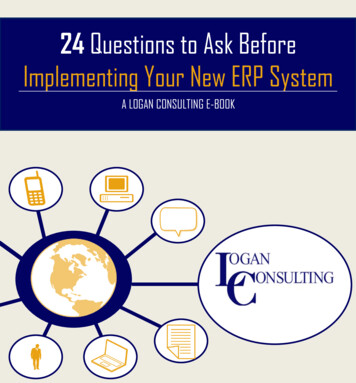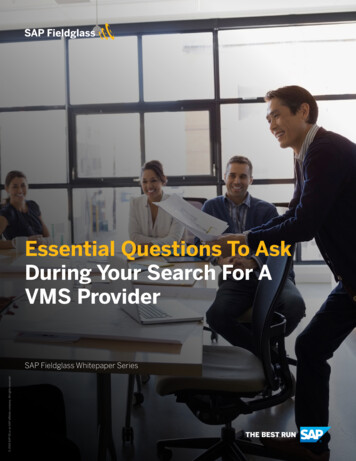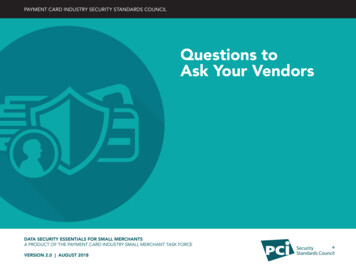
Transcription
24 Questions to Ask BeforeImplementing Your New ERP SystemA LOGAN CONSULTING E-BOOK
WHICH VENDOR FITS YOURCOMPANY BEST?All Vendors Are Not Created EqualThe number of partners, vendors and suppliersoffering ERP solutions is immense. Each hastheir own unique approach, methodology andofferings. You must determine if theirofferings fit YOUR needs and not let themdictate to you based on their approach.
HOW WOULD YOU DEFINEYOUR BUSINESS PROCESSES?Simple, Complex, CustomAn ERP solution is really a tool to assist instreamlining business processes. You need tounderstand and categorize your businessprocesses. Do you have straight-forwardprocesses and are you willing to change andupdate your processes based on the solution youchoose? Do you have complex processes thatrequire a highly configured solution? Whateverthe answer, you will need a solution that fitsappropriately.
WHAT ARE YOUR TRUE GOALSAND OBJECTIVES?One Goal, What’s Your Goal?This seems simple, but you do need to definegoals and objectives for the project. Forexample, go-live by a certain date with certainfunctionality or obtain a specific level of costsavings through streamlined processes. If youbegin with a goal in mind, it will be much easierto achieve!
SHOULD YOUR ERP SYSTEMBE INDUSTRY SPECIFIC?How Unique Are You?Many companies think they are incrediblyunique, but the reality is that their product orservice offering is unique, but the way theyprocess transactions is the same as millionsof other companies. That being said, youshould seek a solution that has companies inyour same industry as satisfied clients. Justdon’t make that the sole decision criteria.
HOW MUCH CUSTOMIZATIONWILL YOU NEED?Customize or Out-Of-The BoxThe decision to customize or stay with out-ofthe-box functionality is one of the most criticaldecisions of the ERP process. Today, we seemore companies trending back to out-of-thebox functionality as much as possible.Companies certainly configure screens andprocesses, but wholesale customizations tothe system are not that common.
HOW MUCH CAN BE DONE WITHSTANDARD FUNCTIONALITY?Standard FunctionalityWhen you are choosing an ERP solution youhave to determine whether you are willing toupdate and/or change your internal processesto take advantage of standard functionality.Many organizations find that they haven’tupdated processes in years and takeadvantage of the opportunity to review andimprove business processes.
WHERE DOES CRM FIT INTOTHE PICTURE?Integrate Your ERP and CRM SystemsAn ERP solution is a great transactional leveltool and reporting solution, but where does aCustomer Relationship Management solution fitinto the picture? Will it be part of your ERPsolution, or will you use a different solutionand integrate it to your ERP solution?
WHAT OTHER SYSTEMS WILLYOU HAVE TO INTEGRATE WITH?ERP Can Do a Lot, But Certainly Not EverythingOne big benefit to an ERP implementation is theremoval of spreadsheets and redundantsystems. However, your ERP system will notremove every system in the company. Otherkey pieces of software (not randomspreadsheets) may remain in place and thosesystems usually need to connect to your ERPsolution.
DOES YOUR ERP SOFTWAREWORK WITH EXISTINGSOFTWARE?How Does This Fit?Regardless of the solution you choose, yourERP solution must work with some solutionsyou use today. Even something as simple asintegration and interaction with officeproductivity tools like e-mail and spreadsheetsis important. For other solutions a commondatabase (SQL, Oracle) or platform (Windows,Linux) are important.
HOW WILL YOURIMPLEMENTATION BE FUNDED?Check PleaseIt may seem obvious, but someone has to payfor all this great new functionality andimprovements. There will be an ROI for theproject, but which departments will fund theproject? Does the project have executive levelsponsorship to fund the project?
HOW MUCH MOBILITY WOULDYOU LIKE WITH YOUR ERPSOFTWARE?On the Road AgainMany people think of ERP as simply a backoffice solution, but do some users need to beable to access the solution from outside theoffice? What about salespeople who may enterorders remotely or need information on theproducts and services you sell that are housedin the ERP solution?
WHERE WOULD YOU LIKEYOUR ERP SYSTEM DEPLOYED?On-Premises, Cloud, HybridWe could probably write an entire new e-bookon the cloud, but how the solution will bedeployed is critical. Some companies onlywant cloud solutions and others have nointerest in the cloud. If you do deploy to thecloud do you have good communicationinfrastructure (think T1 line) to make it work?
HOW MUCH TIME IS ALLOTTEDFOR IMPLEMENTATION?The Project is DueNow that you have a solution in mind, when willit be deployed? We often find companies havebusy or slow seasons to consider. Everyonewill want to drive the project to a quickcompletion, but you need to consider the timerequired of each department and their abilityto participate and complete their tasks ontime.
DO YOU NEED CURRENT DATAIMPORTED?Garbage In – Garbage OutData donversion is a mundane task, but canhave a huge impact on the success of yourimplementation. The key is to find the rightbalance to migrate enough data to make thesystem useful. Our experience is thatcompanies usually need and use less historicaldata than they think.
WHAT SYSTEMS WILL BEREPLACED?Remove Excel!We all understand the core pieces of an ERPsystem, but what about additional “systems” inExcel, Access, etc.? What about a specific toolthat is needed to do business with a keycustomer like Walmart or other largeretailers? Will you be able to replace thosesystems or will you integrate to them? Youmay need to use a phased approach so as notto introduce too much change at once.
WHO WILL HELP LEADIMPLEMENTATION?Project ManagementERP implementations have many moving parts.There are many work streams, departmentsand decisions to be made. Therefore, ProjectManagement is critical to your success.Project Management isn’t rocket science, but itdoes require a dedication to things like statusreports and issues logs. In addition, a well runregularly scheduled project update meetingwill be critical to success.
HOW WILL YOU CHOOSE YOURPROJECT TEAM?There is No I in TeamOnce you have selected a Project Manager youwill need to build a Core Team. Each majorfunctional area will need to be represented bysomeone who understands business processand your internal issues. Again, finding peoplewilling to embrace change will be key. You willalso need to find team members who can allget along.
WHO WILL BE YOUR PROJECTMANAGER?King of the CastleOften times, companies find a consulting firmto assist them with an implementation, butregardless of your approach you will need aninternal project manager. You will need toselect a person who is respected in theorganization and who is willing to embrace thechange that comes with any new system. Theywill need to be objective and understand theconcerns of many different departments.
WHO WILL HAVE THE FINALSAY DURING THE PROJECT?King for a DayNo matter how well everyone works together,there will be disputes. Often times differentdepartments want what is best for themregardless of the downstream effect. Whendisputes arise, who will make the final call? Willyou take issues all the way to an executive boardor owner? Can the Project Manager make thedecision? Having clear guidelines before youstart will alleviate a lot of problems down theroad.
HOW WILL KEY REPORTS BEGENERATED?It is about Analyzing InformationEvery ERP system allows you to enterinformation, some easier than others.However, the big bang for the buck is inproducing reports and gathering information.We often find too much of a focus on enteringdata and not enough thought is given toreporting. Define the outputs you need fromthe system as part of requirements gathering.
WHO WILL MANAGE POSTIMPLEMENTATION CHANGE?The Only Constant is ChangeAs much as people fear change, it is aconstant, and an ERP implementation is nodifferent. Once you are live there will bechanges needed to the system, and ongoingtraining will be important to continue tomaximize the value from the system. So youhave to define who in your organization willmanage that change once you are live. It couldbe the same Project Manager or maybe eachdepartment head.
WHO WILL TRAIN YOUREMPLOYEES?Train the Trainer?Training is obviously an important part of yourimplementation. The biggest question iswhether you will lead the training and developyour own subject matter experts or whetheran outside firm will lead the training.Personally we are big fans of train-the-trainer.We believe it creates buy-in and an internalteam of experts for post implementationsupport.
WHAT BENEFITS DO YOU HOPETO GAIN FROM YOUR ERPSYSTEM?Why Did We Do This?The typical ERP selection cycle is long and youwill see many demos and hear from manysalespeople. It is key to keep the end in mind.You have to always refer back to your goalsand objectives. If you are not sure whichsolution is right for your company go back toyour key requirements and see which solutionmeets those the best.
HOW WILL YOU HANDLEEXPANSION?Moving On UpYou have finished the implementation and itwas a great success. You are getting used tothe new system and your company acquires anew business unit that needs to be integratedinto the ERP system. Whether it is anacquisition, a new product line, internationalexpansion or some other driver, you need tosetup and be ready to expand your systembeyond your business today.
The biggest question is whether you will lead the training and develop your own subject matter experts or whether an outside firm will lead the training. Personally we are big fans of train-the-trainer. We believe it creates buy-in and an internal team of experts for post implementation support. WHAT BENEFITS DO YOU HOPE TO GAIN FROM YOUR ERP SYSTEM? Why Did We Do This? The typical ERP .











